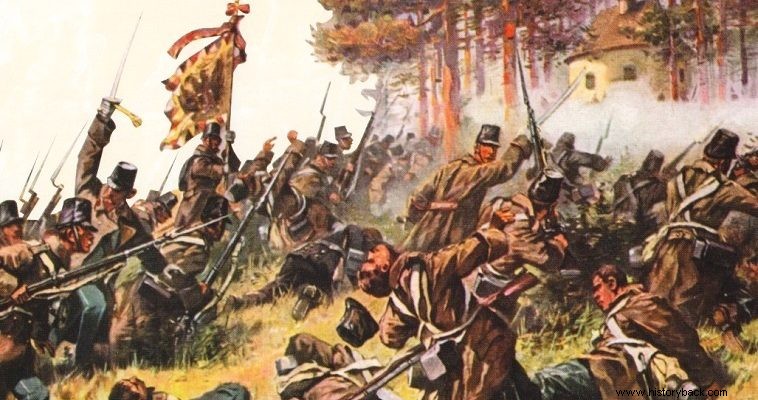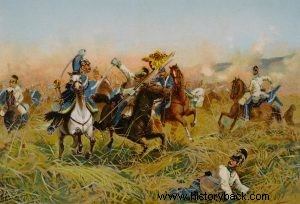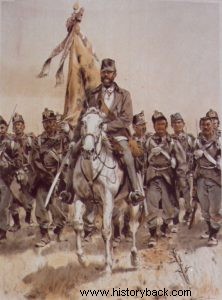
The Seven Weeks War (1866) was a disastrous war for Austria. The Prussian opponents of the Austrians were equipped with the breech-loading "needle-bearing" Dreyse rifle while the Austrian soldiers were equipped with front-loading rifled rifles.
However, the main reason for the defeat of the Austrians was not so much the antiquated armament of their infantry – after all, they were overwhelmingly superior in artillery quality – but the tragic inaction of their leadership, General Ludwig von Benedek. Especially if Benedek had reinforced Trauntenau's forces while they were winning, perhaps the whole course of the war would have been different.
Prussian invasion
The Austrian war plan was problematic from the start. Although Benedek had the possibility of maneuvering on interior lines by successively striking the three Prussian armies cut off from each other, he was nevertheless content to wait passively.
Thus the Prussian 2nd Army under Crown Prince Frederick William passed through the Giant Mountains into Bohemia. General Adolf von Bonin's Prussian 1st Army Corps (SS) moved towards Trautenau, north of Königgratz.
Bonin's forces cleared the passes early in the morning and at about 10:00 a.m. entered the deserted village of Trautenau (present-day Trutnov). The Austrian X SS of General von Gublentz was marching to meet the Prussians. However, the Austrian forces gradually reached the village.
The battle breaks out
Only Colonel Model's Brigade he was already in the area, on the hills behind the village observing the Prussian movements. The Prussian advance guard clashed inside the village with Austrian elite snipers (Jager).
Model, having orders to avoid generalizing the conflict until the arrival of the other units of the XX SS, withdrew his hunters to the hills. Model managed to hold off the Prussians until 12.00. However, he was then attacked by the Prussian 1st Infantry Division (MP) and was forced to retreat. The Prussian 2nd MP meanwhile occupied the hills behind the village.
Austrian counterattack
Shortly afterwards, the rest of the Austrian XX SS arrived in the area and General Gublentz ordered Wibfen's brigade to attack the Prussians and Griwicz's to attempt to outflank the Prussian left flank.
At the same time 40 Austrian guns opened fire on the Prussians on the heights. Austrian artillery forced von Bonin to order a retreat. But before the Prussians began to retreat, they were attacked by the Austrian infantry who rushed out in pure Napoleonic style, in a dense order with bayonets extended.
The Prussians, thanks to their better rifles, managed to stop the attack. But at around 17.00 the fourth brigade of the XX SS arrived on the field, that of colonel Knebel. Knebel, on his own initiative, launched a fierce attack with the spear , recovering the heights and forcing the Prussians to retreat.
The sleeping leadership
Throughout the battle, Gublentz desperately sought reinforcements from Commander-in-Chief Benedek. But his appeals were not heeded by the completely inactive commander-in-chief. And yet if Benedek had sent one more SS into the area, the Austrians could have pushed the Prussians back over the Giant Mountains pass , eliminating the pocket that was being created in front of the main body of the Austrian army.
He should have done the same further west, in Nachod, where he again left the VI SS alone to fight, without support, against the Prussians, but also further east in Eipel. Thus, due to the threat of overwhelming the XX SS from both of its wings, the bloody (4,787 casualties, against 1,400 of the Prussians) victory of the Austrians at Trautenau had no strategic response.


